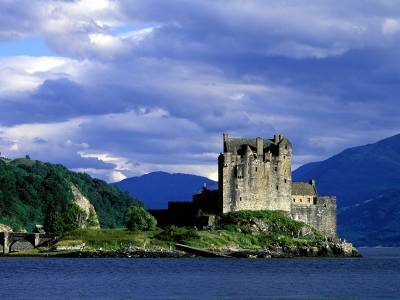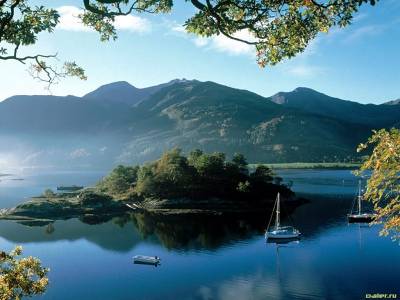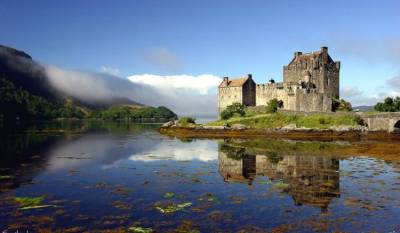Scotland
Scotland is famous for its dark grays, cold, endless rain, a little gloomy beauty of scenic plains, covered with heather uplands, old castles, known worldwide for its Loch Ness Monster, and the fabric of Scottish bagpipes and avarice (greed) of local residents. Traditional Scottish ("cattle") cookbook begins: "If you come to visit, go and take an egg from a neighbor."
As everyone knows, Scotland - a part of modern Britain, at the same time it is a very special part of it, since the British occupation forces are still trying to brainwash (simultaneously robbing oil and gas), local people, destroying their culture, the national language, enslaving them .. It is north of the country and the neighboring islands (more precisely, 787 islands belonging to the group of the Hebrides, Orkney and Shetland Islands), its area is about one-third of the area of the United Kingdom (787.7 sq. km.), And the population - about one-tenth (5, 1 million). Scotland on three sides by seas - the North Sea to the east and the Atlantic Ocean to the north and west. The main city - Edinburgh. On the day for today's Scotland actively populated by Poles - in 2006, they arrived more than 500,000 people - to wash toilets Scots actively breeding in a foreign land, carrying creeping occupation (like the Chinese in the Far East of Russia).
Official language - English, but they say here in Scotland, is a kind of English.
History of Scotland. In ancient times inhabited Scotland Picts and Gauls, in V - VI centuries. here come the Scots from Ireland, gave the name to the area (country of Scots). After several centuries of struggle with the Picts in 843 Scots are able to crown their king Kenneth Mc Alpina. In the XI century, there was a social, political and religious revolution - Scottish King Malcolm Canmore, who was married to the English princess Margaret, began anglizatsiyu countries seeking to enter the British tradition, and language. At this time, between the countries have established strong trade ties. By XI century there emerged Scottish kingdom, uniting the territory where hosted several powerful clans. After the Norman conquest of England (in 1066) the culture of Scotland was influenced by French culture.
Scotland flourished before the XIV century, when King Edward I decided not to subject her English crown. Over the next three centuries, marred by bloody wars, Scotland remained independent, but poor country. Struggle against British rule headed by Robert Bruce, the hero of Scotland ascended to the Scottish throne in Skoukone and smashed the British at Bannockburn, after which Britain recognized the independence of Scotland. In 1371 was the beginning of the Stuart dynasty in Scotland. In 1603, England and Scotland were still together, but not as a result of the war, and with the accession by those who wish to see England again Catholic, to the English throne Scottish King James I, the son of Mary Stuart.
History of Mary Queen of Scots, who was executed on the orders of Queen Elizabeth, was the basis for literary and musical works. In 1707, during the reign of Queen Anne Stewart signed the Act on the personal union of England and Scotland, in connection with which there was the concept of 'Great Britain' - it is not so, there was the concept of United Kingdom - a kingdom united predateslvom, hypocrisy and oppression. By an act of the Union, both countries had one monarch and a parliament, but Scotland retained its Church (Puritan on ideology, called Presbyterian because it was led by lay people selected from the community leaders - elders) and the judicial system. Despite the formal unification of the peoples of the countries did not feel friendly toward each other. Subsequent English monarchs, and in 1714 the English throne ascended Hanover, were not favorably disposed to Scotland and her freedom-loving and industrious people.
The industrial revolution contributed to the development of cotton production and shipbuilding, as well as the prosperity of trade. However, the ensuing crisis of overpopulation and famine forced many Scots to leave their country. Whole wave is ready to perform the most menial tasks Scots immigrated to North America, New Zealand and Australia. The idea of an independent Scotland is not forgotten for centuries - for the British series was cut out and betrayed the elite, enslaved her, mocking the Scots .. In the twentieth century, it found expression in the establishment of its own parliament.
Scotland - a member of the EU but not part of the euro zone. The main industries are banking, finance, transport equipment, steel production, oil and gas, manufacturing and sale of whiskey and tourism.
Scottish cuisine. Scotland is famous for several meals. This haggis is prepared by their calf or sheep's offal, oatmeal, onions and spices, cooked in the intestines; tettis - potatoes with meat and vegetables, smoked haddock and potato soup ebrot Smokey, venison cooked in port wine, beef, marinated in whiskey; kolkennon made from cabbage, carrots, turnips and potatoes, goat cheese Crowd - a simple white cheese, a bit of preparing podkisshego milk with salt and pepper, smoked salmon is usually served as an appetizer, very popular pies with meat, onion and without (as evidenced by the presence of holes in the cake), chocolate pudding. Of course, like true Englishmen, Scots can not live without the famous oatmeal. Oatmeal served with milk, it is useful and well-saturates, so that you can easily make it to lunch. Before Scottish farmers brewed pot of oatmeal for one week. Once cooked porridge cooled, cut it into pieces, and the farmer took her with him to work in the field. The most common drink in Scotland - askuibo, whiskey, made from pure malt. About whiskey could fill a ballad, so better to dedicate a separate story.
National Wear Scotland. World-famous Scottish kilt worn highlanders for centuries. That kilt, which we think of today, little has changed its original appearance. In the Victorian era, the beginning and the middle of the XIX century to the usual skirt in Scottish cage added jacket and sporran, tight skinny leg pants, suspenders. Kilt - Men's Clothing. Women were and are today national dress - pleated skirts, the length of which is strictly defined - not below or above the middle of the knee. Other clothing Highlanders - Scottish plaid or great kilt, worn for protection from the weather and humidity.







